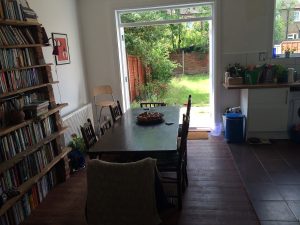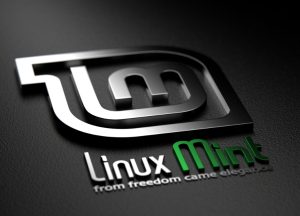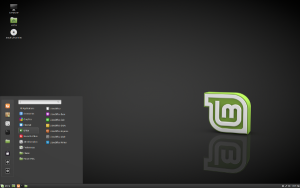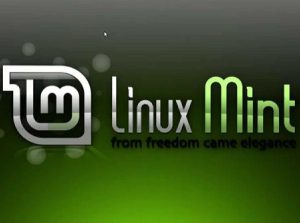I’ve found that learning about how to change to open source software can be difficult for non-techies. Yes, you can easily find the websites that contain the information you need, but it’s almost never written in a style that non-techies can understand. A lot of knowledge is assumed, and often, non-techies give up and have to wait until a techie friend helps them to switch at some point in the future. It doesn’t have to be like that though – I think that a lot of IT / open source enthusiasts assume that most people are as interested in the technical aspects of IT as they are, but in my experience, most people find it really tedious, and are just waiting for the day that they can tell their computer to do things, and it will do them, without them having to understand anything about how it does it. Bliss, as far as I’m concerned.
But open source is great, it’s easy to get started and we should support it, for the following reasons:
- it’s free (as in gratis)
- upgrades are free too
- avoids ‘vendor lock-in’ – i.e. software that will only work with one company’s products
- fewer bugs
- more secure
- works well on old computers – you don’t have to keep buying new kit
- you don’t have to support corporations, or make Bill Gates richer
See here for more basic information.
What’s a ‘non-techie’?
A non-techie is possibly someone who is not an ‘innovator’ – just a ‘user’, at least when it comes to computers. We live in a complicated world of specialist disciplines. Someone who’s devoted their career to learning brain surgery can’t be expected to know much about rocket science – or car mechanices, or film production or welding. And why should they? If someone’s operating on my brain, I don’t want them wasting their time learning how to grow radishes. Stay focused, I’d say.
But yes, I expect them to be able to make a cup of tea, or switch a computer on. When I say that I’m a non-techie, I can actually do quite a lot. I can make fliers in Libre Office, and turn them into pdfs; I can manipulate images in lots of interesting ways; I can build lots of different kinds of web pages; I can do clever sums in spreadsheets etc. I’m not a Luddite (although a) I think the Luddites were great, and b) I refuse to have a smart phone: there’s nothing that a smartphone does that I need, over and above what a dumbphone does – so I might be a Luddite after all). But I’m definitely not a techie either – it’s not my thing. I gravitate towards the political philosophy section of bookshops.
Apart from lack of interest (I use a car to get from A to B, but I’m not interested in looking under the bonnet. There are specialists for that, and I’d be taking work away from them), I don’t have the time – life’s too short to spend time learning things I’m not interested in. But I do want to drive sometimes, and I do want to switch to open source – just not if it’s too difficult. Most people are the same, I think. I have friends who are NHS workers, academics, builders, therapists, writers – and almost none of them know anything about open source.
I’m still amazed by the people who are unable to open Libre Office documents that I send to them. I explain what it is, and how to download it, so hopefully I’m helping to reduce that number. But there’s also been a noticeable increase in the number of open source documents I get, so I know that (at least among the people who email me, which isn’t a random sample of the population, I know) awareness is growing. People often switch to open source (or in fact, anything new), when they have a friend who is an enthusiast, and who shows them how to switch, one programme at a time.
My experience
Below is a list of the things that I do with open source. I don’t do an enormous range of things, and nothing too complicated, but as I said, I’m not a complete novice, so there are lots of things you can use open source for. If you know how I could do things better, or where the corporate sector has taken over (see below), then if you could let me know, that would be great.
Seriously, if I can do these things, so can you.
Web browser: alternative to Internet Explorer, Chrome etc.

This one’s easy. It’s Firefox, it works in exactly the same way as the two browsers above, and so there’s nothing new to learn.
Download Firefox for free here.
Chrome and IE have their eyes on you – they’re tracking where you go and what you buy, so that you can be targeted with corporate advertising (let alone any privacy / surveillance issues). None of that with Firefox.
Word processing / desktop publishing: alternative to Microsoft Word

Libre Office Writer. I used to use Open Office, but I was informed that it had been re-absorbed back into the corporate sector, and the open source geeks had left it in droves for Libre Office – which is the one that is being updated more regularly now. So Libre Office Writer it is now.
It works like a dream for me. It’s much easier to use than Word – so much so that when I’m forced to work in a Word document, it’s very confusing (it also feels dirty – like being forced to shop in Lidl). Also, Libre Office lets you copy content and drop it anywhere you like. Copying from Word and dropping it into Libre Office isn’t possible, because it seems to drop the content into a text box from which it’s impossible to extricate anything. So the first thing I do if I receive a Word document is save it as a Libre Office and delete the Word doc.
Download Libre Office for free here.
Spreadsheets and presentations: alternatives to Excel and PowerPoint

Libre Office Calc. This comes as part of the Libre Office suite above, and if you can use an Excel spreadsheet, you can use Calc. There’s also a presentation package called Impress, as an alternative to PowerPoint, and again, if you can use PowerPoint, you can use this one. Don’t worry about the hardware at the venue where you’re giving your presentation not being able to recognise the package – all programmes in the LibreOffice suite are fully compatible with just about anything – more so than Microsoft products.
PDF creator

In the past, I’ve got advice from people about creating PDFs, and have had to download some special software, and more recently, to print a document using CutePDF. Now I don’t have to worry about that. There’s a button in the toolbar of Libre Office Writer that just, well, creates a PDF from the document you’re in. Nothing could be simpler, really. I’ve had problems before with the PDF not being exactly the same as the source document, but since using the button in Libre Office Writer, not a single problem.
Image manipulation: alternative to Photoshop

Gimp. Free, and as far as I can tell, there’s nothing that Photoshop (not free) can do that Gimp can’t. You can get as complicated as you like, but personally, I don’t need to go into much detail. I can size, rotate and crop images; I can cut out parts of an image and drop it somewhere else; I can add text to an image; I can make banner ads; I can put several images together. Having said that, I still don’t know what layers are, but it seems that for what I want to do, I don’t need to. Everything I know about Gimp, I’ve learned from other enthusiasts online (see below).
The only strange thing I’ve found with Gimp is that when I’ve finished working on an image and want to save it, you don’t click File/Save As, you click File/Export. I did begin to read up on why this was the case, but got bored and gave up. It works fine as long as you remember to do it.
Download Gimp for free here.
Media Player: alternative to Windows Media Player

VLC Media Player. I found that when using other media player, especially Windows Media Player, it often asked me to download codecs or patches (whatever they are) before I could play a video. I’ve never seen this with VLC. There were some videos that just wouldn’t play at all with other software, but VLC seems to be able to play a rusty nail – anything, no problem.
Download VLC Media Player free here.
Blogging & websites

WordPress. You probably know about WordPress, as it’s growing so quickly – so much so that it’s estimated that around 25% of websites globally were built using WordPress. I used to build the Lowimpact.org website using Dreamweaver, then had to do something involving ‘file transfer protocol’ to actually make the pages live. Since switching to WordPress a few years ago, life has become much, much simpler. Lowimpact.org is a bad example here, as the site itself is so complicated. We needed a web designer to build the foundations and make it see the domain name etc., but after that, updating the pages is a doddle. A click on the ‘publish’ button makes it live with no complications. Again, so many people use WordPress that there isn’t a problem that you could come across that you won’t find a forum discussion / instructional video / tutorial about online.
Learn more about WordPress here.
Virus protection
Somebody correct me if I’m wrong here, but I’ve been assured that you don’t need it.
What if I get stuck?
Because open source is enthusiast-driven, if you put any question into a search engine, you’ll get lots of forum discussions and videos about how to do what you’re trying to do. For me, this is a much easier route than looking at official tutorials or guides, which always seem to assume knowledge I don’t have. Gimp is the best example of this. I can now do lots of things with images that I couldn’t do a year ago, because of help from people who know a bit more than me. That’s often the key – people who know a bit more than me speak my language, and people who know a lot more than me don’t.
But if you’re still stuck after doing your research, you can pay an open source specialist to help you. Although the programmes themselves are free, support and services can be charged for, and this is the way open source software developers / specialists can make a living but still stay on the ‘open source way’.
The Empire strikes back
I know that open source is not perfect, and that in many cases, the corporate sector is trying to infiltrate it or even take it over (see below), and I know they’ve been successful in some cases.
There’s something quite sad about the corporate sector using the work of volunteer enthusiasts to make profit, but it’s still free – and therefore something we don’t have to give corporations money for at the point of use.
Android, for example, is in theory open source – an operating system for mobile phones. But you couldn’t really say that it’s non-corporate – the corporate sector can release open source, free software, but harvest data from it, to target advertising. They also sell apps that only work on ‘their’ open source software, which is against the spirit of the movement. And also, corporates make money from service contracts – e.g. if a government uses ubuntu – they might pay a corporation many millions per year to maintain the infrastructure.
Microsoft try to make it as difficult as possible for people to jettison their software. Apart from forcing most people to pay for a Windows operating system when they buy a laptop – produced by another corporation (in a you-scratch-my-back-and-I’ll-scratch-yours sort of way), they make it difficult in lots of small ways, like copying content from Microsoft to open source products.
Next – Linux: alternative to Windows operating system

So next, I want to stop using the Microsoft Windows operating system. Now is the time for me to do it, because if you could see the laptop I’m writing this on, you’ll wonder how it coud have kept going under the circumstances. The fan’s broken, so if I’ve had a Skype chat with you recently, you’ll know that it sounds like a jet aircraft taking off a lot of the time (although it would have sounded worse for you, as you’re inside my computer, if you see what I mean). Also, the right-hand hinge is broken, so the screen is connected to the hard drive by a couple of exposed wires. I do like to get the most out of things, and it’s had a good life and given good service. Enough is enough now though – it’s time for a new one.
There’s not much I can do to avoid giving money to the corporate sector when it comes to buying a laptop (although someone might know something?), but I can avoid paying anything to Microsoft. I used to think that this was impossible (and it might have been), because every laptop that you buy comes with Windows installed. But I’ve since discovered that you can buy laptops without Windows, so I’m going to go for one of those – and I’ll install Linux instead, then I’ll blog about it to let you know how I get on.
Linux is the main open source alternative to Windows – and as it’s an operating system, it underpins everything else, and so is both more important and more complicated than any of the software above. I’m going to have to practice, so I know how to use it first, before I dive in.
This process can be as easy or complicated as you like. I spoke to several people who blinded me with science, so I put it off, but then recently I had a conversation with a friend of a friend who made it sound very simple. Basically, I need to download Linux onto a datastick, then use it to work on my documents in the normal way, just underpinned by Linux rather than by Windows. When I shut down and remove the datastick, I’m back with Windows – so if it becomes too difficult, I can bail and return to Windows to regroup and plan my next move. I’m going to follow his advice, and let you know what happens.
Things are changing all the time in the IT world, and it’s been difficult to find a source of information that’s not too shrouded in technical jargon. This site – https://opensource.com/resources/what-open-source – is probably the best open source site I’ve found – one that’s not entirely focused on techies, and therefore incomprehensible to mere mortals. There are interesting articles, guides, and the resources section provides lots of alternatives to commercial software. If anyone knows any better sources of information, or anything useful about open source, and can explain it in a non-technical way, please let us know below.






















8 Comments
I’ve used a number of free softwares, but recently I have also been caught out by the extra software that, if you are not really paying 101% attention to what you are doing, comes down with the open-source and freeware, and can take over your browser. It can add pop-ups that can be really hard to get rid of. I’ve found that even downloading some reputable open source web browsers can do this to you now.
I always try to take care to un-tick those boxes which are easily missed when you start to download/ install these apps, and end-up allowing piggy-back apps to be installed, which can feel like they’ve hijacked your PC.
But, I recently found a download service called Ninite which seems to be trustworthy. If you download through their site the software seems to be free of malware, adware etc., and they have a free download service option, which provides a web page that contains links to the popular open-source software that I use. Still keep alert though because you never know when someone will find a way around services like Ninite.
Thanks for the advice Steve. I tend to go to the websites of the software itself – so for example I got Gimp from gimp.org – and I can honestly say that I’ve never had one single problem. If I remember right, there were sometimes tick boxes that you had to make sure you unticked, otherwise you’d get something you didn’t bargain for. But yes, as long as you pay attention, you can just untick anything you don’t want. I didn’t find that they tried to sneak anything under your radar.
This has come at a good time for me. The hard drive on my old laptop broke a few months ago and I have been asking around to see how to replace it. I found that they could be bought quite cheaply but that I needed an “operating system” and I didn’t know what one was at that point. I will now give Linux a try. Does anyone know whether it can be uploaded onto an empty hard drive, as Dave appears to describe here how he uses Linux but that his computer has Windows. Does Linux need Windows to run or something?
I gave up gmail a long time ago, and at the same time began using Start Page instead of Google. Firefox is also very good. I’ll now try the other software. Thanks.
Andrew
No, I haven’t used Linux yet. I’ve just used the software mentioned above, on Windows. Linux is next – and it will replace Windows, so it doesn’t need Windows to run. You can use open source software on Windows, so that you can get used to the various programs, then you can switch to Linux for the operating system.
I’m going to play with it from a datastick first, then when I get a new laptop, only have Linux – so it’s very important not to heed the advice of most people in computer stores – that is, to buy a laptop with Windows, then replace it with Linux. That way, Microsoft still get some of your money – which is what I want to avoid. I want to help build the market for laptops with Linux installed as the operating system, rather than Windows. It’s started.
Your comment proves my point by the way – I know that you’re very technically-minded, but even you haven’t got your head around open source. IT geeks think and write in a way that assumes everyone understands it. I don’t know why – it’s specialist knowledge. Car mechanics wouldn’t assume that everyone knows how their car works – just how to drive it.
Let’s help open source break out of geekland and bring it to the masses!
Great article Dave.
Andrew, yes you can install Linux directly onto a blank hard drive, doesn’t need Windows.
Download Linux onto a USB drive, and when you start the computer it should load Linux from USB. If you like it, you can then install it onto your new hard drive – this is even easier than doing a ‘dual boot’ which lets you choose between Linux and Windows on the same machine.
There is one possible ‘gotcha’ – the BIOS (all those words that flash up when it first switches on) needs to know to boot from USB. Setting this involves pressing whichever button it says you need to press, typically a function key or Esc, them you will find a whole new world of options. It should give you something about ‘Boot Order’ – just make sure USB harddrive is at the top of that list. Many laptops will do this by default, so you only have to tinker with this if it doesn’t work first time.
Swapping a hard drive sounds scary but is usually only a matter of unscrewing the back of the laptop, undoing the screws holding the drive in place, swapping it for the new one, plugging in the connector for the new drive, then screwing everything back in. A small Phillips screwdriver is all you should need! Best of luck.
I was actually looking on the internet today about how to install Linux onto a new hard drive, and I came across “BIOS” and other unfamiliar terms and just gave up. So thank you Simon.
I’m absolutely fine with the unscrewing and physical installation of the thing. I’m engineering-minded, but not gadget and computer-technical. It is indeed the jargon that loses me at a very early stage.
So, Simon, if I buy a new hard drive and swap it for the old one, then buy a Linux download and put it onto a USB using a different computer (correct so far?), then plug this USB into my old laptop (with new hard drive), are you saying that I’ll get something like the old BBC-type, flashing cursor screen which will direct me as to how I upload it?
Also, once uploaded, will I then no longer have to plug the USB in?
Thanks again,
Andrew
I had the new hard-drive and then Linux (ubuntu) installed on my laptop over Christmas. It now runs with this and Libre Office. I think it is excellent and wish that I had changed over years ago. It is very easy to use and feels a lot “cleaner” than Windows in that it doesn’t have all the gimmicky stuff that Microsoft uses to try and sell a new version every few years, which also makes a system that is very clear and simple. I also like, as Dave said, the fact that I am not supporting Microsoft and that makes it feel “clean”. I like the colours too and the easy way that it works in general. It does everything that Windows does but better.
I didn’t do the install by the way, but called at my home town over Christmas and got these people to do it: http://www.airedalecomputerrecycling.co.uk. They are a social enterprise that trains people and recycles computers, and they charged me £50 for the full job of Linux, and all the other stuff like Libre Office, Firefox, etc.
What was a broken computer is now better than it was before, and I didn’t have to spend £300 on a new gadget with a new system and no instructions, etc. I’d definitely recommend it.
Andrew
That put a big smile on my face. £50 sounds like a reasonable price, to avoid the installation learning curve. I did it though, and I’ll blog about it soon, if people want to copy what I did (and if I could do it, anyone can).